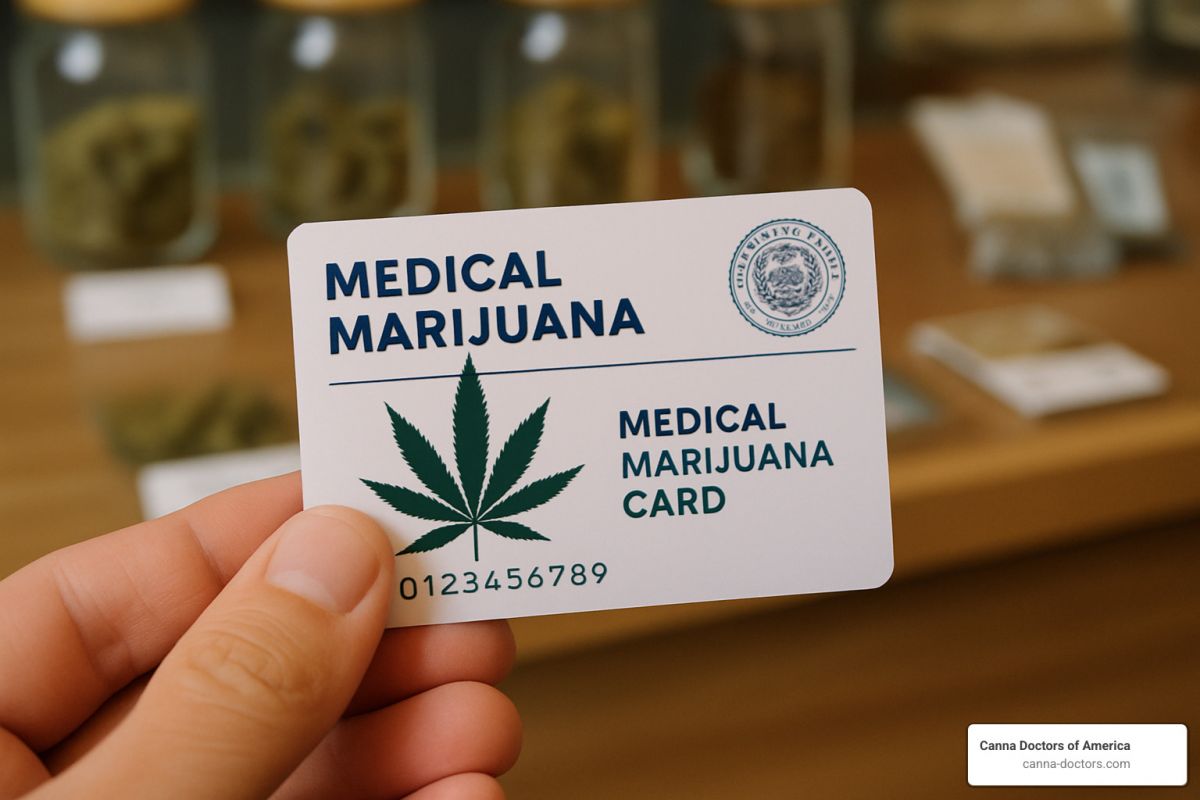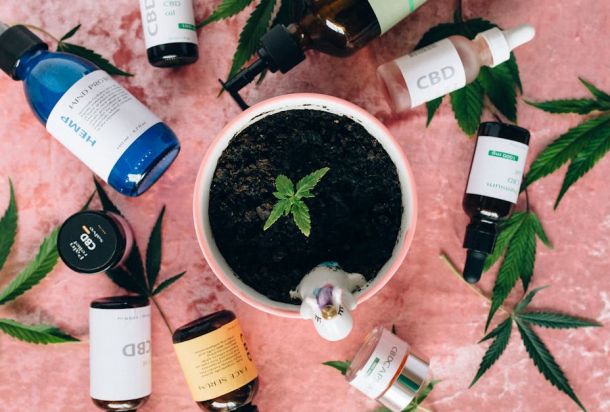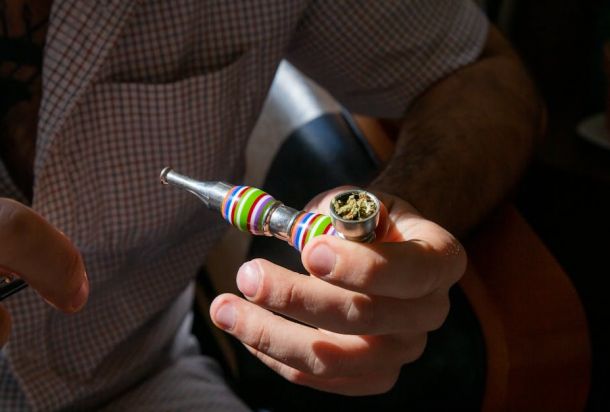High Time You Got a Marijuana Card? Here’s Your Guide

Why Getting a Marijuana Card Could Transform Your Healthcare Journey
A marijuana card is your official state-issued identification that allows legal access to medical cannabis products at licensed dispensaries. If you’re dealing with chronic pain, anxiety, or other qualifying conditions, this card could be your gateway to alternative treatment options.
Quick Marijuana Card Overview:
– What it is: State-issued medical cannabis patient ID card
– Who qualifies: Residents with qualifying medical conditions (chronic pain, PTSD, cancer, epilepsy, etc.)
– Key benefits: Tax savings, higher potency products, legal protection, exclusive dispensary access
– Cost: $40-$75 state fees (varies by location)
– Timeline: 10-30 days for approval, same-day digital cards available
– Renewal: Required annually in most states
Over 700,000 patients are registered in Pennsylvania’s Medical Marijuana Program alone, while Florida processes applications in an average of 10 business days through their online system. The process has become increasingly streamlined, with many states now offering telemedicine evaluations and same-day approvals.
Whether you’re frustrated with traditional medications or seeking compassionate care alternatives, understanding your marijuana card options is the first step toward potential relief. Virginia even made their cards optional in 2022 – you only need a written certification from a licensed practitioner to purchase medical cannabis.
I’m Geoff Massey, Regional Director of Canna Doctors of America, where I help patients steer the marijuana card process and find the right cannabis treatments for their individual needs. My experience guiding thousands through medical marijuana evaluations has shown me how transformative proper access to marijuana card services can be for patients seeking alternative healthcare solutions.
Your Marijuana Card Roadmap at a Glance
Your marijuana card is much more than a simple ID – it’s your official patient identification that opens the door to legal medical cannabis access. Think of it as your healthcare passport, complete with legal protections and privacy safeguards that recreational users simply don’t have.
This small piece of plastic carries significant weight. It proves you’re a registered patient in your state’s medical cannabis program, which means you’re protected under state law when purchasing, possessing, and using medical marijuana. Even better, all your medical information stays confidential under HIPAA privacy regulations, just like any other medical treatment.
Here’s where things get interesting: we’re dealing with a complex state versus federal landscape. While cannabis remains illegal at the federal level, your state program acts as a legal shield within your state’s borders. Your card includes everything dispensaries need – your photo, legal name, patient ID number, and expiration date.
Most states set purchase limits between 2.5 to 8 ounces per month, though the exact amount depends on where you live. Our streamlined Process page walks you through every step, making what seems complicated surprisingly simple.
What Is a Marijuana Card & Why You Might Need One
Your marijuana card functions as official photo identification that links you directly to your state’s medical cannabis registry. Each card contains a unique registry number that dispensaries scan to verify your legal status and track your purchases within state limits.
The financial benefits alone make the card worth getting. Medical patients typically enjoy tax savings of 15-25% compared to recreational users. In Florida, medical marijuana purchases carry no sales tax at all, while recreational users in other states often face combined taxes exceeding 25%.
When you consider that recreational cannabis taxes can reach 40% in some areas, your card pays for itself pretty quickly. Those savings add up fast, especially if you’re using cannabis regularly for medical treatment.
Core Benefits Over Recreational Use
Medical cardholders get exclusive access to higher-potency products that recreational dispensaries simply can’t sell. While recreational users might be stuck with 10mg THC limits per dose, medical patients can access much stronger formulations designed for their specific conditions.
Age restrictions tell an important story too. Recreational cannabis requires you to be 21, but medical patients can get cards at 18 years old (or even younger with caregiver help). This opens treatment doors for young adults dealing with epilepsy, chronic pain, or PTSD.
Exclusive dispensaries create a completely different experience. Medical-only locations focus on patient education and personalized treatment plans rather than recreational sales. The staff receives specialized training in cannabis therapeutics, and the environment feels more like a pharmacy than a retail store.
These dispensaries often carry products you won’t find anywhere else – specialized tinctures, high-CBD formulations, and targeted treatments developed specifically for medical conditions.
Who Qualifies? Medical Conditions, Age & Residency
Getting a marijuana card isn’t as complicated as you might think. The list of qualifying conditions has grown tremendously over the years, and chances are good that your condition qualifies for medical cannabis treatment.
Chronic pain tops the list in nearly every state, and for good reason – it affects over 50 million Americans who often struggle with traditional pain medications. If you’re dealing with ongoing pain that impacts your daily life, you’re likely a strong candidate for a medical cannabis evaluation.
Beyond chronic pain, conditions like PTSD, epilepsy, cancer, and glaucoma appear on virtually every state’s approved list. Many patients are surprised to learn that anxiety, depression, and sleep disorders often qualify as well. The medical community has increasingly recognized cannabis as a legitimate treatment option for these conditions.
What’s really exciting is how states have acceptd physician discretion. Many now include “comparable conditions” language, meaning your doctor can recommend medical cannabis for conditions not explicitly listed if they believe it would help you. This flexibility has opened doors for patients dealing with migraines, inflammatory bowel disease, and even severe insomnia.
Residency requirements are straightforward but important. You’ll need to prove you live in the state where you’re applying – usually through a driver’s license, state ID, or recent utility bill. Some states welcome seasonal residents too, as long as you can document your temporary residence.
For a deeper dive into specific conditions and how cannabis might help, check out our detailed guide: What Medical Conditions Can Marijuana Help With?
Marijuana Card Eligibility Checklist
Before your consultation, gathering the right documents makes everything smoother. Your state-issued photo ID is essential – it proves both your identity and residency in one shot.
Medical documentation doesn’t have to be extensive. A recent doctor’s visit summary, prescription bottle, or even pharmacy records showing treatments for your condition usually suffice. Don’t worry if your records are scattered across different doctors – our physicians understand that medical histories can be complex.
The physician evaluation itself is refreshingly simple. Whether you choose telemedicine or an in-person visit, expect about 15 minutes of conversation about your symptoms, current treatments, and how they’re working (or not working) for you. Our doctors focus on understanding your specific situation rather than checking boxes.
Comparable & Physician-Discretion Conditions
Virginia leads the way in physician flexibility by essentially eliminating their rigid conditions list. Their doctors can now recommend medical cannabis for any condition they believe would benefit from treatment. This approach recognizes that medicine isn’t one-size-fits-all.
Professional judgment has become the gold standard. If you’re dealing with symptoms that significantly impact your quality of life – whether it’s chronic back pain from an old injury, severe menstrual cramps, or anxiety that keeps you awake at night – there’s a good chance you qualify.
The beauty of this system is that it puts medical decisions back where they belong: between you and your doctor. If traditional treatments haven’t given you the relief you need, medical cannabis might be worth exploring.
Step-by-Step: Applying in Florida, Virginia & Pennsylvania
Getting your marijuana card has never been easier, thanks to modern online systems and telemedicine options. Gone are the days of lengthy paperwork and confusing government offices – most states now let you complete everything from your couch.
The beauty of today’s process lies in its simplicity. You’ll need your proof of residency (like a driver’s license), physician certification from a qualified doctor, and the state fee – usually between $50-$75. Most exciting of all? Many patients receive their digital cards the same day as their telemedicine appointment.
Processing timelines vary dramatically by state. While some offer same-day digital access, physical cards typically arrive within 10-30 business days. The key is starting with states that have acceptd modern technology. For detailed Florida regulations and research, check the official Scientific research on Florida MMUR.
Florida Application Basics
Florida’s system feels refreshingly straightforward once you understand it. The $75 processing fee covers everything – your evaluation, state registration, and physical card mailed to your door. Most patients receive approval within 10 business days, though the digital version often comes much faster.
The MMUR login portal connects directly to Florida’s DMV database, which means your photo and residency information transfer automatically. This clever integration eliminates the most common application delays that used to frustrate patients.
Here’s what makes Florida special: you can start the renewal process 45 days before expiration. The system actually sends you email reminders, so you’ll never accidentally let your card expire and lose access to your medication.
Virginia: Optional Marijuana Card Explained
Virginia took a bold step with House Bill HB933 in 2022, essentially making the physical card optional. Think about that for a moment – you only need a written certification from your doctor to walk into any dispensary and make purchases.
The $50 optional card fee covers registration if you want the official card, but many patients skip it entirely. Your doctor’s written certification carries the same legal weight and gets you the same access. It’s like Virginia decided to cut through the bureaucracy and focus on what really matters – getting patients their medicine.
Digital cards appear immediately in your patient portal after certification. The whole process emphasizes medical recommendations over government paperwork, which feels like the way things should work.
Pennsylvania Fast Facts
Pennsylvania’s program operates under Act 63 and covers 24 specific qualifying conditions. The state provides excellent support through their registry portal, with real humans available at 888-733-5595 from 7AM to 9PM, seven days a week.
Act 63 of 2023 expanded the program even further, showing Pennsylvania’s commitment to improving patient access. The electronic tracking system monitors every cannabis product from seed to sale, ensuring quality and safety throughout the supply chain.
The application process mirrors other states but with Pennsylvania’s trademark attention to detail. Once approved, you’ll have access to dispensaries throughout the state, each operating under strict medical protocols.
After Approval: Using, Renewing & Protecting Your Card
Congratulations! Your marijuana card approval opens the door to a whole new world of medical cannabis access. You’ll now have legal access to licensed dispensaries throughout your state, with significantly better purchase limits than recreational users enjoy.
The differences are pretty impressive when you compare medical versus recreational access. Florida allows registered patients to purchase up to 4 ounces within a 30-day period, while recreational users in other states might find themselves limited to just 1 ounce. That’s a substantial difference when you’re managing chronic conditions that require consistent medication.
Your card comes with important responsibilities and protections. HIPAA privacy laws safeguard your medical cannabis information, ensuring your treatment remains confidential between you and your healthcare providers. However, it’s worth noting that some employers may still conduct drug screenings, so understanding your workplace policies remains important.
Renewal requirements are straightforward but essential to maintain your legal access. Most states require annual renewal, with renewal windows typically opening 45 days before your card expires. This gives you plenty of time to schedule your follow-up appointment and avoid any interruption in your treatment.
Interstate travel with medical cannabis creates some complications you should understand. Reciprocity varies dramatically between states – some honor out-of-state medical cards while others require you to purchase only within state lines. Always research local laws before traveling with your medication.
What to Bring to the Dispensary
Your first dispensary visit might feel a bit overwhelming, but knowing what to bring makes the process smooth and straightforward. You’ll need both your state-issued ID and either your physical marijuana card or digital certification for every visit. Virginia patients have it especially easy since their written certification serves this purpose perfectly.
Payment options at dispensaries remain somewhat limited due to federal banking restrictions. Most locations accept cash or debit cards, though credit card processing is still uncommon. It’s smart to call ahead and confirm payment methods if you’re unsure.
First-time patient discounts are common throughout the industry, often ranging from 15-25% off your initial purchase. Many dispensaries also offer educational consultations to help you select appropriate products for your specific condition and experience level. Don’t hesitate to ask questions – the staff wants to help you find effective treatment options.
Renewal & Replacement Made Simple
Renewal timing is crucial for maintaining uninterrupted access to your medication. The 45-day renewal window in most states provides ample opportunity to schedule your follow-up physician consultation and submit updated paperwork. Online renewal systems have made this process much more convenient than the early days of medical cannabis programs.
The renewal process typically involves updating your physician certification and paying annual state fees. Most patients find renewal appointments quicker than their initial evaluation since you’re already established in the system and familiar with the process.
Lost or damaged cards don’t need to cause panic. State patient portals usually handle replacement requests efficiently, typically charging a small service fee for new physical cards. Digital cards provide immediate backup access while physical replacements are processed and mailed to you.
Cardholder Rights & Legal Limits
Understanding your legal protections helps you use your marijuana card confidently while staying within state guidelines. Your card provides solid legal protection within your state boundaries, but federal law still classifies cannabis as illegal. This creates some complex situations for federal employees, interstate travel, and airport security interactions.
Possession limits exist to protect you from legal complications. Exceeding these amounts can result in criminal charges even with a valid medical card, so staying within your state’s guidelines is essential. These limits are typically generous enough for most patients’ monthly medication needs.
Public consumption remains illegal in all states, regardless of your medical status. Your medication is intended for private use in appropriate locations. Employer protections vary significantly by state and company policy, so understanding your workplace’s stance on medical cannabis use is important for your job security.
For current guidelines about traveling with medical cannabis, especially through airports, review the official Transportation rules to stay informed about federal policies and state-specific regulations.
Telemedicine, Costs & Money-Back Guarantees
Getting your marijuana card has never been easier thanks to telemedicine. Gone are the days of sitting in waiting rooms or driving across town for a quick consultation. You can now speak with a licensed physician from your couch and receive same-day approval for medical cannabis treatment.
The cost breakdown is surprisingly affordable when you consider the long-term benefits. Physician evaluation fees typically range from $150-$250, while state registration costs add another $40-$75 depending on your location. That’s often less than what many patients spend on a single month of traditional prescription medications.
What makes the process even more appealing is the risk-free guarantee many clinics now offer. If you don’t qualify for a marijuana card after your evaluation, you get your money back. No questions asked, no hidden fees – just honest medical assessment.
The beauty of telemedicine evaluations lies in their convenience and speed. Our patients often complete their consultations during lunch breaks or after work hours. Same-day digital approvals mean you could be shopping at dispensaries within hours of your appointment, not weeks.
Secure payment processing ensures your financial information stays protected throughout the entire process. Most clinics accept major credit cards and offer transparent pricing with no surprise charges. Ready to get started? Book Appointment and take the first step toward alternative healthcare.
Choosing a Trusted Marijuana Card Doctor
Finding the right physician makes all the difference in your medical cannabis journey. Licensed physicians who specialize in cannabis medicine understand both the therapeutic benefits and legal requirements that protect you as a patient.
Telehealth regulations have opened doors for remote consultations in most states, but not all providers are created equal. Look for doctors who offer transparent pricing, money-back guarantees, and ongoing patient support beyond just issuing your initial recommendation.
At Canna Doctors of America, we’ve built our reputation on helping thousands of patients steer this process with confidence. Our same-day approval system combined with personalized treatment guidance ensures you’re not just getting a card – you’re getting comprehensive care custom to your specific needs.
The best cannabis doctors take time to understand your medical history, current symptoms, and treatment goals. They should explain how different cannabis products might help your condition and provide guidance on dosing and consumption methods. This level of care transforms your marijuana card from just a piece of plastic into a gateway to effective treatment.
Frequently Asked Questions about Marijuana Cards
Getting your marijuana card often brings up important questions about privacy, family access, and travel. These are some of the most common concerns our patients share during consultations, and understanding these details helps you make informed decisions about your medical cannabis journey.
Is my data confidential under HIPAA?
Your medical cannabis information is absolutely protected under HIPAA privacy laws, just like any other medical treatment. State registries must follow the same strict confidentiality rules as hospitals and doctor’s offices, which means your patient data stays private and secure.
This protection extends beyond just the registry system. Your employer cannot access your medical cannabis information without your written consent, and insurance companies can’t peek at your patient records either. Even law enforcement faces significant restrictions when it comes to accessing your medical information.
The only exceptions involve very specific legal circumstances, like court orders in criminal cases. For everyday situations – job applications, insurance claims, or routine interactions – your medical cannabis use remains completely confidential under federal privacy protections.
Can minors or caregivers obtain a marijuana card?
Minors can absolutely access medical cannabis with proper parental or guardian involvement. The process requires a parent or legal guardian to register as an official caregiver, taking responsibility for managing the minor’s treatment and dispensary visits.
Most states allow caregivers to assist up to two patients, whether they’re minors or adults who need help managing their medical cannabis. Caregiver registration typically costs between $25-50 annually and requires separate renewal alongside the patient’s card.
The caregiver system works particularly well for families dealing with childhood epilepsy, cancer treatments, or other serious conditions where traditional medications haven’t provided adequate relief. Parents often find this gives them better control over their child’s treatment while ensuring legal compliance.
Can I use my marijuana card in other states?
Reciprocity rules vary dramatically from state to state, making travel planning essential for medical cannabis patients. Some states welcome out-of-state medical cards with open arms, while others require you to stick with local purchases only.
Recreational cannabis states often provide the most flexibility, allowing medical patients to purchase products even without local cards. However, you’ll still need to follow that state’s specific possession limits and usage rules, which might differ significantly from your home state.
The safest approach involves researching your destination’s laws before any trip. What’s perfectly legal in your home state might create serious problems elsewhere, especially when crossing state lines with cannabis products. When in doubt, many patients choose to establish care with local providers in states they visit frequently.
Conclusion
Your journey to better health might be just one marijuana card away. If chronic pain, sleepless nights, or anxiety have been controlling your life, medical cannabis could offer the relief you’ve been searching for. Thousands of patients across Florida have already finded how this legal alternative can transform their daily experience.
The process doesn’t have to be complicated or stressful. At Canna Doctors of America, we’ve helped countless patients take this important step with same-day approvals and compassionate telemedicine consultations. Our experienced physicians understand that every patient’s situation is unique – that’s why we focus on personalized care plans that actually work for your specific needs.
What makes us different? We’re not just processing applications. We’re building relationships with our patients in Tampa, St. Petersburg, and Clearwater. From your first consultation through ongoing treatment support, our team stays with you every step of the way. We believe healthcare should feel personal, not like you’re just another number in the system.
The best part? You can explore your options completely risk-free. Our money-back guarantee means if our physicians determine medical cannabis isn’t right for you, you get a full refund. No hidden fees, no complicated paperwork – just honest, straightforward care.
Ready to see if a marijuana card could change your life? Learn more & schedule today to start your journey toward legal, effective treatment. Sometimes the biggest step toward feeling better is simply having a conversation with someone who understands.
Explore more about marijuana card:
– florida medical weed
– how can i get medical marijuanas card









